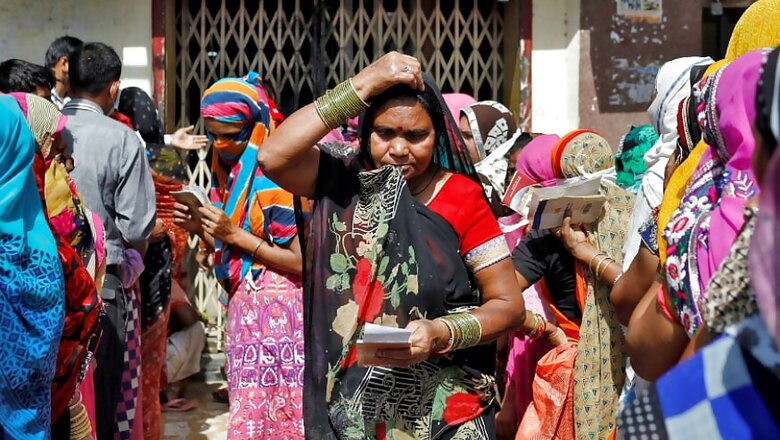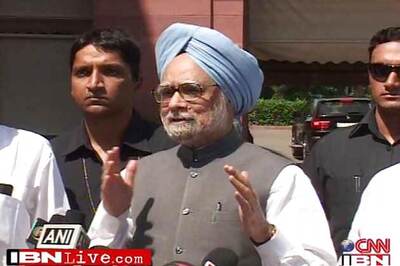
views
The first thing to be said about the world after the coronavirus lockdown is that it cannot be — and it should not be — the world before the coronavirus lockdown.
Yes, a cure to the COVID-19 pandemic will be found. Sooner, hopefully, than latter. The cure, let’s also hope, will become affordable and universally accessible. Science has discovered effective remedies to many killer diseases in the past — small pox, malaria, plague, cholera, to name a few. Coronavirus cannot escape human ingenuity, especially since thousands of top-notch scientists are currently working on the problem in various countries, benefiting from the revolutionary power of digital networking and collaboration.
Yet, despite a cure awaiting its birth in some lab somewhere around the globe, humanity simply cannot afford to go back to the old ways of conducting its affairs. Its goals, its outlook, its guiding principles, and its inter-national and intra-national relations have to change. Its iniquitous economic and development models have to change. Its violent and mutually destructive relationship with the planetary ecology has to change. Its ineffective, inefficient and often insensitive governance institutions, especially those tasked with global governance, have to change. Above all, the way individuals live their lives also has to change. The wisdom of Mahatma Gandhi’s words, “Be the change you wish to see in the world,” constantly reminds us that all sustainable change must begin with us, with me.
All change in history — change at the macro (societal) or micro (individual) level — is either forced by objective circumstances or is effected by subjective consciousness. On one hand, situations, especially crisis situations, compel us to change, leaving no other option. On the other, mature institutions and thoughtful individuals, having learnt the right lessons from the long history of the human race, proactively seek to introduce the necessary change. Only when the latter factor is strong enough to guide the former do new breakthroughs happen.
Planet Under a Lockdown for Repairs
The objective pressure for change is already undeniably apparent. Never in known history has almost the entire human population in the world faced the same health crisis at the same time, creating a situation that can be best described as the ‘Planet Under a Lockdown for Repairs’. Neither the number of people infected with the coronavirus (1.5 million-plus and rising), nor the number of deaths (100,000-plus, and rising) tell the real story. For example, the fatalities so far are far less than the number of people killed in the First World War (20 million) and the Second World War (50-56 million) — or even in the major US wars in Vietnam (3 million) and Iraq (2.4 million) in the post-WWII era.
Yet, the COVID-19 pandemic is uniquely different from anything the world has seen in the past. For the first time in human history, there is a fearful awareness in every person that the deadly virus could infect me and I, in turn, could infect others, unless I take necessary precautions to keep myself from the harm’s way. Also, never before, not even during the two world wars, were the wheels of the global economy so comprehensively immobilised as now.
The real question is: when the cure comes, will we as individuals, and will the world as a whole, go back to pre-corona times? Very likely. After all, the force of habit and inertia makes us willing prisoners of the familiar. Furthermore, change, especially major change, always meets with fierce resistance from status-quoists. They will fight back to protect their vested interests even though the old order cannot cope with the massive disruptions caused by the pandemic both in India and globally — supply chains are broken; businesses are battered; jobs have evaporated; the economy stares at the worst ever recession; personal and state finances are stressed; and people are worried about the future like never before. The more serious the malady, the more thoroughgoing will have to be the treatment. Therefore, one can only hope that a critical mass of bold and radical ideas, coming from struggle-ready change-seekers, will coalesce to reshape the world in new ways.
What are the five Big Ideas that can renew the world, and make it better for all, after the coronavirus crisis is behind us?
Making ‘Health for All’ a reality for 7.8 billion people
One: ‘Health for All’ must not remain merely a nice-sounding slogan, tucked away in the manifestos of political parties. It must be implemented on a war footing — yes, on a war footing — to benefit the planetary population of 7.8 billion, and with the same all-nation effort with which lockdowns are being enforced. And since the World Health Organisation is very much in the news these days, it helps to remember that the WHO had given a clarion call to the international community to achieve the goal of ‘Health for All’ by 2000, way back in 1978, at its historic conference in Alma Ata, Kazakhstan.
This is what the Alma Ata Declaration had affirmed: “Health, which is a state of complete physical, mental, and social well-being, and not merely the absence of disease or infirmity, is a fundamental human right and that the attainment of the highest possible level of health is a most important world-wide social goal.” It voiced serious concern over “the existing gross inequality in the health status of the people, particularly between developed and developing countries as well as within countries” and observed that this “is politically, socially, and economically unacceptable.”
Four full decades have passed since the call was given, and two decades have elapsed since the new-millennium deadline for ‘Health for All’. How much progress has the world made? Where, for example, is India? Here are a few mind-numbing facts. As many as 840,000 children in India die before completing the first year of their lives, many of them due to diarrhea and pneumonia, both preventable diseases. 25 lakh premature deaths in India are caused by pollution alone. The number of people suffering from various disabilities is a staggering 2.68, which is 2.21 per cent of the total population. As in developed nations, quality healthcare is becoming increasingly unaffordable even to the middle classes, not to speak of the poor.
The newly felt concern in India for the health and safety of everyone in the wake of the corona crisis is, of course, welcome. But can we afford to lapse into forgetfulness and apathy about the huge magnitude of mortality and morbidity due to traditional diseases, which especially target the poor and the vulnerable? If that were to happen, it would only prove that India has been alarmed by the spread of the corona pandemic only because, unlike the diseases of the poor, it now threatens to kill the rich and the powerful too.
Human Security more important than National Security
Two: Human Security must be regarded as more important than National Security. Human security calls for creation of reliable conditions for the entire planetary population to live a life of dignity. In the application of this moral principle, there can be no exception, nor any discrimination, on the grounds of nationality, religion, ethnicity, educational status, class, caste and gender. Health and wellbeing, especially for women, children and senior citizens, form the bedrock of human dignity.
The assertion that human security must gain precedence over national security may sound blasphemous. After all, we are now living in an era in which hyper-nationalism of the most intolerant kind has become the reigning virtue in many countries around the world, including in India. Imaginary enemies of the nation are being identified both within and outside national boundaries. It is not long ago that the slogan “Desh ke gaddaaron ko, goli maaro saalon ko”(Shoot down the traitors) was raised by rioting mobs targeting innocent Muslims in the streets of the national capital. People are made to believe — in USA, China, India, Pakistan, Russia, Saudi Arabia, Iran, Qatar and elsewhere — that their nation’s security is imperiled by “hostile” nations, and therefore military preparedness must take priority over everything else. Humungous financial and other resources are being spent on developing, buying and selling, ever-more lethal weapon systems. The world’s military spending soared to USD 1.8 trillion in 2018. Sixty percent of it came from just five countries: The United States ($649 billion), China ($250 billion), Saudi Arabia ($67.6 billion), India ($66.5 billion) and France ($63.8 billion).
Let’s go back to what the WHO Declaration said on this issue in 1978: “An acceptable level of health for all the people of the world by the year 2000 can be attained through a fuller and better use of the world's resources, a considerable part of which is now spent on armaments and military conflicts. A genuine policy of independence, peace, détente, and disarmament could and should release additional resources that could well be devoted to peaceful aims and in particular to the acceleration of social and economic development of which primary health care, as an essential part, should be allotted its proper share.”
At the beginning of April, the UN Secretary-General, António Guterres, one of the sanest voices in the world today, appealed to nations to contribute the equivalent of at least 10 percent of the annual income of the entire planet to a massive “human-centered, innovative and coordinated stimulus package” to combat the COVID-19 crisis. Where will all this money come from? A bulk of it must be mobilised by making big cutbacks in military spending so that necessary resources can be made available to the critical determinants of affordable ‘Health for All’ — clean air, clean water, clean and nutritious food, sanitation, decent housing and habitats, production of life-saving drugs and medical equipment, a sound healthcare infrastructure at primary, secondary and tertiary levels.
All conflicts must be resolved non-violently
Three: De-militarisation of international relations is absolutely essential for both human security (hence for the all-round development of human communities) and national security (hence for the all-round development of nations). The single most important lesson the corona crisis has taught us is this: in our inter-connected and inter-dependent world, no country can remain safe and immune when pandemics like these break out. Such existential threats to our lives, livelihoods and economies can be effectively countered only with the widest and strongest possible unity, solidarity and cooperation among nations and communities. If this is true, how can it become untrue when the very survival of the human race is threatened by the stockpiles of nuclear weapons and other weapons of mass destruction? And let’s not forget that these dangerous toys will always be deemed necessary so long as powerful nations continue to play the game of militarising themselves for regional and global domination. Human beings can never be healthy, much less safe, if nations do not abandon their faith in violence and wars as a way of conflict-resolution.
Ecological security must become a global priority
Four: Human security and national security must be premised on ecological security. The conflict between uncontrolled economic growth and non-stop environmental destruction has not only led to genocidal extinction of many non-human species on our planet, but is also endangering the human species itself. There is now abundant evidence to show that destruction of the environment is one of the chief factors contributing to diseases and deaths around the world. There is speculation that the corona virus has originated from man-animal conflict. Pope Francis has gone to the extent of saying that the COVID-19 pandemic is one of "nature's responses" to humans ignoring climate change and the current ecological crisis. Here is his radical advice: slow down the rate of production and consumption (except to fulfil the basic needs of the poor) and learn to live in harmony with the natural world.
The same advice was also given by Mahatma Gandhi, who had clearly foreseen the unsustainability of Western patterns of production, marketing and consumption, and had warned India about the danger inherent in imitating them. He wrote in Young Indiaon 20 December 1928: “God forbid that India should ever take to industrialisation after the manner of the West. The economic imperialism of a single tiny island kingdom (England) is today keeping the world in chains. If an entire nation of 300 million [India’s then population] took to similar economic exploitation, it would strip the world bare like locusts.” When asked if he wanted India to enjoy the same kind of lifestyle as in Britain, his incisive reply was: “It took Britain half the resources of the planet to achieve this prosperity. How many planets will a country like India require?”
This does not mean turning back the wheels of history and pushing the world back to the pre-industrial revolution era. That is impossible. But what is not only possible but also necessary is to use the revolutionary power of modern science and technology to minimise the contradiction between human progress and ecological integrity. Used wisely, the tools of the Fourth Industrial Revolution — Artificial Intelligence, Internet of Things (IoT), blockchain, robotics, 3-D printing, crypto-currencies, nanotechnology, genetics, etc — can arrest and reverse ecological damage, while ensuring fulfilment of the human needs of the entire global population in a healthy manner. These new technologies are also great supporters of caring and sharing economies, which can promote human solidarity on a global scale.
Human beings will then realise that there is more to life than being slaves of materialism, consumerism and individualism, and that there are higher and happiness-enhancing potentialities to be realised. Sant Tukaram, one the great 17thcentury Marathi saint-poet, has put it succinctly: ‘Eka meka sahaayya karoo, avaghe dharoo supanth’(Let us help and support each other, and follow the path of righteousness — in our families, communities, countries and the world.)
Absolute national sovereignty is a thing of the past
Five: Democratic global governance must be strengthened to ensure sustainable global development as well collective global security. The days of each country singing its own separate tune are decidedly over. If the world is one indivisible family, the music we create must be harmonious, and not an unbearable cacophony. In other words, post-corona pandemic, the world will need more globalisation, not less.
The deaths and devastation due to World War II forced the international community to establish some institutions of global governance, mostly under the aegis of the United Nations. But these have proved to be grossly inadequate to address the new as well as old needs and problems of the global community. The twin crises triggered by the coronavirus pandemic— the public health crisis and the economic crisis — have already underscored that there is simply no substitute to worldwide coordination and cooperation, often in real-time. Even after the immediate corona calamity abates, reconstruction of the global economy to ensure equitable and sustainable development is going to take a long time. Who will plan, guide and manage this massive task? Only strong global governance institutions can. For this, national exclusivism and untenable claims of absolute national sovereignty must give way to meaningful global dialogue and cooperative action. Are nations ready for this? Obviously, big and powerful ones must shed their arrogance and lead the way.
Yes, the crisis is unprecedented in human history. But equally unprecedented is the opportunity it has given us to heal our wounded world. Should we waste this good opportunity?



















Comments
0 comment